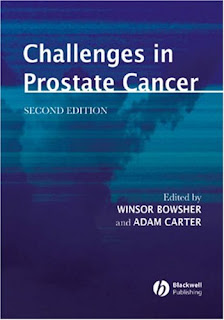Challenges in Prostate Cancer, 2nd Ed

by Winsor Bowsher (Editor), Adam Carter (Editor)
Editorial Reviews Review
"Currently there are more questions than answers in prostate cancer and
the authors certainly could not have been expected to provide all the
solutions for these many difficult issues. They have set out the
problems clearly, however, and by doing so set a challenge for all of us
in the urological community to provide the evidence based resolution
to these many thorny issues by carefully constructed, long-term
randomised files." British Journal of Urology "...contains useful
information and is a helpful resource for understanding many of the
controversies in this area." The Lancet
"Currently there are more questions than answers in prostate cancer and
the authors certainly could not have been expected to provide all the
solutions for these many difficult issues. They have set out the
problems clearly, however, and by doing so set a challenge for all of us
in the urological community to provide the evidence based resolution
to these many thorny issues by carefully constructed, long-term
randomised files."
British Journal of Urology "...contains useful information and is a
helpful resource for understanding many of the controversies in this
area."
The Lancet
Product Description
Prostate cancer continues to be a major threat to men's health, the
second most common cancer in men, in many countries. Therefore it is
increasingly important that those faced with difficult clinical
questions make the right decisions. Since the first volume was published
in 2000, many debates persist but new controversies have also emerged,
reflected in the chapters of this new volume. New authors have been
recruited to give their insight into newer areas of this controversial
topic.
Challenges in prostate cancer provides a series of state-of-the-art
review articles, each of which addresses and answers a contentious
question. It includes chapters on medical and surgical management of all
stages of prostate cancer, clinical investigation, epidemiology,
clinical trials and basic scientific research and covers issues such as
the genetic basis of cancer, clinical economics and influence.
The authors have used their expertise to distil the available evidence
into practical advice to be used by busy urologists in their day-to-day
practice. And as well as being an overview of current practice many
chapters attempt to give insights into the future direction of prostate
cancer research and clinical management.
